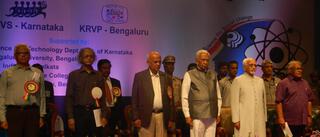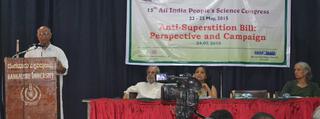All India People's Science Congress: Science for social change
Published on

Rational thinking is known to be deeply intrinsic to the teaching principles of science education. Other than the formal disciplines of sciences, even in the daily lives of the general public, educators, researchers and activists have tried to reinforce rational thinking as an irreplaceable tool.
An example of this is seen in the People’s Science Movement (PSM) in India, a heterogeneous science movement that is one of its kind in the world. Since its inception in mid-80s (through the National Literacy Mission), the All India People’s Science Network (AIPSN) consolidated various science popularisation organisations across India and led sustained activity in inculcating rationality through pedagogy, social awareness and other methods.
All India People Science Congress
The recently concluded 15th All India People’s Science Congress (AIPSC) in Bangalore reinforced this point across various areas concerning science, technology and society. Two organisations of AIPSN: Bharat Gyan Vigyan Samiti (BGVS) - Karnataka and Karnataka Rajya Vijnana Parishat (KRVP) - jointly organized the event; both of which are spearheading people’s science movement in Karnataka.
In his introductory remarks, the President of AIPSN, Mr. D. Raghunandan put forward two central themes of the Congress:
Promotion of scientific temper in understanding the natural world and our social systems
In our society, remnants of feudalism continue to persist in all walks of life, including in S&T institutions. One of the ways to cleanse it is by developing scientific temper and critical thinking abilities. In that direction, several workshops, talks and discussions focused on the challenges in science education, growing assault on scientific temper and rationalists, and a critical appraisal of Indian contribution to science, among many others.
Development and self-reliance
This is particularly important at a time when a thrust toward development has been fostering inequality among the masses by impacting them socially, economically and environmentally. The speakers reflected on a need for an alternative perspective on people’ development and on other wide ranging issues such as climate change, water scarcity, public health and drug policy; while critically examining the concept of ‘smart cities’.
The Honourable Vice President of India, Dr. Hamid Ansari in his inaugural address, remarked that the central theme of the Congress was apt at the present juncture and reminded the audience of the need to fulfil the constitutional duty of developing scientific temper. Additionally, he emphasised the need for fighting against ignorance, superstition, obscurantism, irrationality and resulting bigotry.

Distinguished Scientist and Bharath Ratna Professor C. N. R. Rao criticised the central government for drastic cuts in the budgetary allocation for research in fundamental sciences. He also opined that science & technology education, especially in universities and research institutions, was being neglected and that the nation would pay a price in the future for the same. Professor U. R. Rao, the former chairman of ISRO, warned that wasteful use of natural resources and destruction of environment are reaching dangerous proportions. He regretted that while many challenges loom conspicuously, many highly educated people including scientists and leaders from other walks of life continue to believe in blind faith, astrology, and superstition and scarcely engage themselves in contemporary social concerns.
Expressing similar views, Professor Satyajit Mayor, Director of National Centre for Biological Sciences (NCBS) argued that science as a practice drew deeply from rational methods, and thus the question of inculcating scientific temper could not be ignored by educators and practising scientists. He also rang an alarm that distinguishing science and mythology was necessary, and without robust rationale it would leave behind a festering trail of myths accepted as true dogmatically, misleading a larger section of people.
Secretary of the BGVS Karnataka Ms N Prabha expressed satisfaction that the BGVS’ commitment to inculcate scientific temper is receiving much needed reinforcement from scientists, educators and science popularises across the country. Acknowledging the support, AIPSC passed a resolution to build and sustain a nation-wide integrated movement of the different PSMs to resist growing intolerance and obscurantist exploits. In that direction, BGVS is of the conviction that an anti-superstition legislation that protects people from obscurantist exploits is the need of the hour and has taken up the task of spreading the movement across the state.